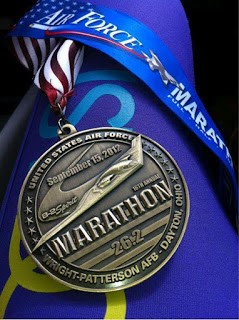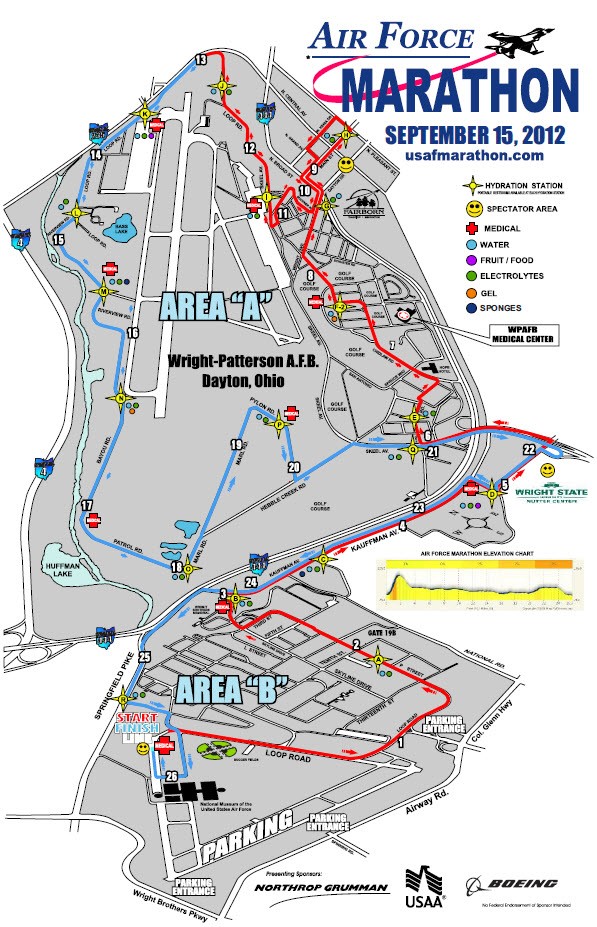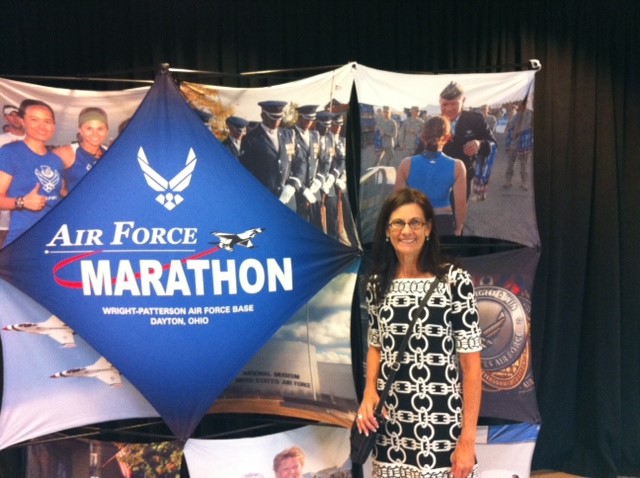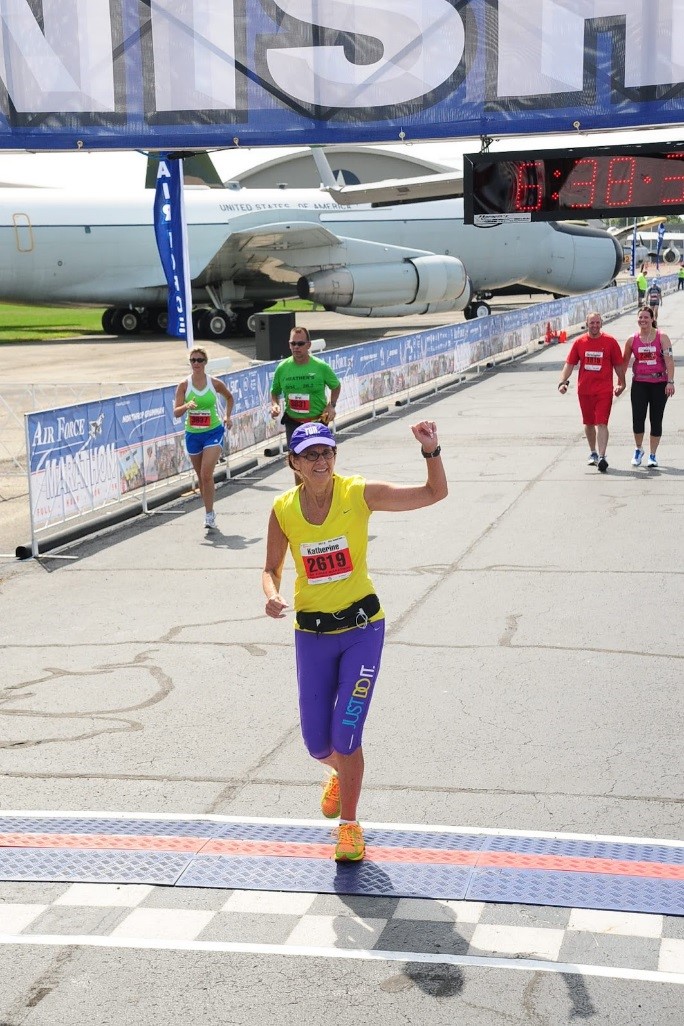You're never too old...
This post was originally published in 2012.
SOMETIMES THE REAL VICTORY IS NOT CROSSING THE FINISH LINE BUT CROSSING THE STARTING LINE.
 It’s easy to say, “One day I’m going to write a book,” or, “One day I’m going to run a marathon.” Brash statements often fall under the category of pipe dreams.
It’s easy to say, “One day I’m going to write a book,” or, “One day I’m going to run a marathon.” Brash statements often fall under the category of pipe dreams.
Occasionally, like a bone spur irritating a nerve, pipe dreams fester and cause a flare-up. We either have to eat our words or act on them.
I was in my late twenties when I first said, “One of these days, I’m going to write a book.” At that time, I had no idea what I wanted to write. Up until then, I’d only written poetry. But the idea took root. Over the next twenty years, I fueled the idea with the writings of James Michener, Robert Ludlum, Sidney Sheldon, Stephen King, Ken Follett, Jackie Collins, Danielle Steel, Louis L’Amour, Tom Clancy, Scott Turow, Barbara Taylor Bradford, Judith Krantz, and probably my favorite, Clive Cussler.
As writers, we are the sum total of all we have read. Thanks to Elizabeth Lowell, Beatrice Small, Linda Howard and others, I found a home in romance, and in 1997 finally took action. The result was the poignant love story The Ruby Brooch.
Okay, one pipe dream marked off the list. What about the other?
Whoa, there a minute. You really think a 62-year-old grandmother allergic to exercise can turn into a marathoner? That’s not just a pipe dream, that’s a dream already gone up in smoke.
Not necessarily. Add a pinch of goal setting and a dash of motivation and see what you get.
Motivation, huh? Well, I did want to live long enough to see my five grandchildren grow to adulthood. With a long family history of heart disease, the odds weren’t in my favor if I continued to live a sedentary lifestyle while eating all the wrong foods.
How to take the first step? Walk, my dear. Start slow. So I did, and within weeks I was walking three miles a day. I also stopped eating junk food, and the pounds slipped away, and my dress size shrank from an 8 to a 2.
On September 22, 2011, I ran my first mile.
How does running one mile translate into running 26.2 a year later?
Goal setting.
I set a goal to run a 10K on Thanksgiving Day. Even that goal seemed daunting, so I had to break it down into small steps. Step 1: Buy appropriate shoes and clothing. If you’re going to be a runner, look like a runner. Step 2: Add mileage gradually. Two-mile runs became 3, 4, then 5.

After the 10K I set a new goal to run a half-marathon. I did that on March 31. As soon as that race was over, I set a new goal. Run a marathon.
Did I think I could do it? Yes. Was I willing to put in the work? Yes. Was it more than I bargained for? Yes.
But isn’t that always the case?
Training to run a marathon took much more than motivation and goal-setting. It took commitment and coming face-to-face with fear and staring it down.
During April, May and June I stuck to my schedule and did every training run. I ate what I needed to eat to fuel my runs. But as the mileage increased and 14, 16, 18 and 20-mile runs loomed, I knew I needed to add cross-training a couple days a week to the schedule. Strengthening my upper body would make me a stronger runner.
The first week in July I had two workouts in the gym, one yoga class, ran 22 training miles, and competed in a July 4th 5K run—and won my age division!
Then my body rebelled, and I ended up with a pinched nerve in my neck. I cut back on everything but running, though even that was painful. But I ran through the pain. You hear all the time about athletes playing through their pain. How do they do it? They stay focused on the goal. But I wasn’t a well-trained athlete. I was basically a couch potato-turned-runner. Also, I was still a competitor, born and bred.
By the end of August, after four months of training, I decided I couldn’t do the race. My health was suffering, I was tired, and the goal seemed unrealistic given my physical condition. I decided to focus on letting the pinched nerve in my neck heal, and I quit training.
Two weeks later I realized I co uldn’t live with myself if I didn’t at least try, so I recommitted to the goal. If all I could run was 5 miles or 10 miles or 18 miles, I would come out a winner because I showed up and gave the race my best effort. Was I afraid? You betcha.
uldn’t live with myself if I didn’t at least try, so I recommitted to the goal. If all I could run was 5 miles or 10 miles or 18 miles, I would come out a winner because I showed up and gave the race my best effort. Was I afraid? You betcha.
The day before the race, I went to the expo and picked up my bid, T-shirt and hat. I now had mementos. If I didn’t finish and get a medal, at least I had the hat!
That night I didn’t sleep. I finally gave up tossing and got up at 3:30 a.m and ate a bowl of oatmeal. At 5:15 a.m. I drove over to the Nutter Center on the campus of Wright State University to catch the bus to the Air Force Museum. The bus let us out next to a field. We had to walk across the wet grass to get to the starting line. By the time I reached the other side, my shoes and socks were soaked. I shivered for two hours until the start of the race. And, yes, I came away with a cold.
At 7:00 a.m. I called my friend, Connie, and we prayed, just as we’d done before the half-marathon. Shortly before the start of the race, a B-2 Spirit Stealth Bomber did a flyover. Talk about awesome.
And then the gun sounded and thousands of runners rushed forward. I didn’t get caught up in the frenzy. Instead, I walked backwards. I didn’t want to cross the starting line until I set MapMyRun on my iPhone. The settings were off, and although I tried to get the app working again, I never did get it synced up. In hindsight, it was the best thing that could have happened. I crossed the starting line still trying to fix the app and ended up walking to the 1-mile mark where I finally gave up on the tracking device and ran the race naked. (That’s runner talk for running without a watch to track your mileage and pace.)
I had previously downloaded Dean Koontz’s book Breathless to my iPhone. I switched it on and immediately got drawn into the story. I forgot about the pain in my neck and arm. I forgot about the time. I forgot about the long miles ahead.
At the 4.5-mile mark my daughter called to let me know she and her family were at the 5-mile hydration station. I told her I wasn’t sure I had it in me to go the distance.
“Are you going to quit?” she asked.
“Not yet,” I answered. I could walk, and as long as I could, I’d stay in the race. It didn’t matter how I got to the finish line – run, walk, crawl, I’d get the same medal as those who finished hours before me.
I met Lynn, Jeff, and two of my grandchildren at mile-9/10.
I ran the race exactly as I had trained. I walked when I wanted to walk. I ran when I wanted to run. There was no pressure to do one more than the other.
At mile 16 I was still on schedule. I reached a hydration station, where two men were grilling. I asked what they were cooking and they said, “Hot dogs and hamburgers. You want one?” At that point it was 11:30 and, except for energy gels, I hadn’t eaten since the bowl of oatmeal at 4:00 a.m.. I think that burger with ketchup and mustard was the best I’d ever had.
When I reached mile 20, I’d been at it for more than 5 hours (time 5:01). My 20-mile training run had been 4:54. I was now 7 minutes behind schedule. The end was finally in sight, though, and I knew for the first time that I could complete the race within the 7-hour time limit.
I turned the audiobook off at the 26-mile mark. I wanted to hear the crowd during the last .2 of a mile. It seemed surreal. Sort of like the first time I held my first published book. I heard the announcer call my name, “Katherine Logan, Lexington, KY,” and then I crossed the line. I was now a marathoner.
I don’t know what I expected, but I discovered the real sense of accomplishment had come weeks earlier. The anguish, the pain, the joy, had all come during the training runs. I had celebrated each small step. Thirteen miles, 16, 18, 20. Those were my accomplishments. Those were the hard-fought battles. Those were the days I wouldn’t quit, even when I was in pain and my knees buckled.
For this marathoner, the accomplishment was not crossing the finish line. The real accomplishment was crossing the starting line.
What’s the takeaway?
You are the sum total of your life experiences. Those early defeats build character. Those early disappointments fuel your passion for success. Those early regrets teach you that even though you might fail, not trying is worse. As I said on this blog a few days ago, I couldn’t have lived with the regret had I not put my toe on the starting line. Before you give up on anything, be sure you can live with the decision.
Am I glad I raced and would I do it again?
Yes and yes. Who wouldn’t want to see another B-2 Stealth bomber flyover?
Keep writing and running, Kathy





